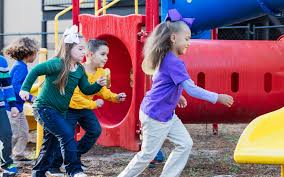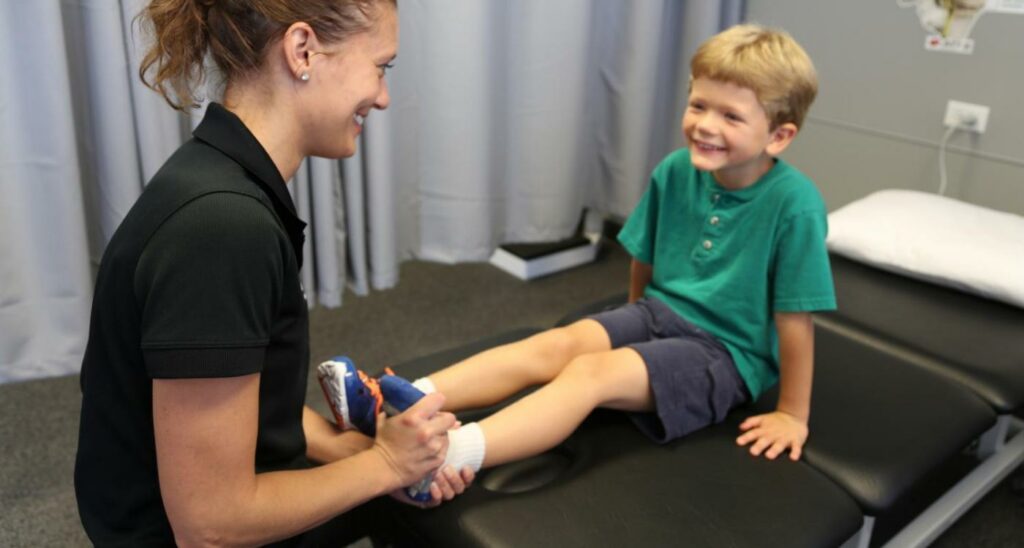Did you know that developmental physical therapy can help children with disabilities reach their fullest potential? There are many benefits of developmental physical therapy, including improved motor skills, communication abilities, and social interactions. If your child has a disability, it is important to consider enrolling them in developmental physical therapy. In this blog post, we will discuss some of the developmental physical therapy examples in more detail. And, we will discuss the benefits it offers.
Contents
What Is Developmental Physical therapy?

Developmental physical therapy is a type of therapy that helps babies, toddlers, and young children with movement and developmental problems. It is based on the belief that all children have a natural ability to move and develop.
The goal of developmental physical therapy is to help children reach their full potential by improving their physical, cognitive, and social skills.
Why Developmental Physical Therapy Is Important?
Developmental physical therapy is a type of therapy that helps infants and young children with developmental delays or disabilities. The therapist uses different techniques to help the child improve their gross and fine motor skills, as well as their cognitive and social skills.
There are many benefits to developmental physical therapy. It can help the child become more independent and improve their quality of life. It can also help the family by providing support and education.
If you are wondering if your child would benefit from developmental physical therapy, talk to your doctor or pediatrician. They can refer you to a therapist in your area.
What Are Some Developmental Physical Therapies?

There are various kinds of physical therapy that are important. They are as follows: –
Sensory Integration
This is a type of therapy that helps in the development of the child’s ability to process information from their senses. It is important for the child to be able to understand and interpret what they see, hear, touch, smell, and taste. This will help them develop properly both physically and mentally. For example, a child who is not able to process information from their sense of touch will not be able to develop a sense of balance and coordination.
Motor Skills
This therapy helps in the development of a child’s motor skills. These skills involve the coordination of muscles and movement. A child needs to be able to develop these skills in order to be able to carry out activities such as crawling, sitting, standing, walking, and running. For example, a child who is unable to sit up independently will be given exercises to help them build the strength and coordination needed to do so.
Balance and Coordination
This therapy helps in the development of a child’s ability to maintain their balance and coordinate their movements. This is important for activities such as climbing, jumping, and riding a bike. For instance, a child who has difficulty maintaining their balance may be unable to climb onto a playground structure or catch a ball. A child with poor coordination may have trouble writing or buttoning their clothing.
Balance and coordination therapy can help improve a child’s ability to perform these activities. The therapist will work with the child on exercises that challenge their balance and coordination. The therapist may also use games and activities to help the child practice these skills.
How Does Developmental Physical Therapy Work?
Developmental physical therapists use a variety of techniques to help infants and young children with developmental delays or disabilities. These may include:
Strength and Endurance
This therapy helps in the development of a child’s muscle strength and endurance. This is important for activities such as carrying out daily tasks and participating in sports. For example, a child may need to work on their arm and leg muscles if they are having difficulty walking.
Joint and bone health
Developmental physical therapy also works to promote joint and bone health. This is important for overall movement and function. For example, a child with arthritis or other joint problems may benefit from exercises that help to strengthen the muscles around the affected joint. For children with conditions like scoliosis, physical therapy can help to prevent further deformities and improve the child’s overall quality of life.
Flexibility
This therapy helps in the development of a child’s muscle flexibility. This is important for activities such as stretching and reaching. For example, a child with cerebral palsy may have tight muscles. This can make it hard for them to do things like put on their clothes or brush their teeth.
Cardiovascular Endurance
This therapy helps in the development of a child’s cardiovascular endurance. This is important for activities such as running and playing. For example, if a child has low cardiovascular endurance, they may become easily fatigued during play.
Respiratory Endurance
This therapy helps in the development of a child’s respiratory endurance. This is important for activities such as running and playing. For example, if a child has asthma, this therapy can help the child breathe better and have more energy to play.
Body Awareness
This therapy helps in the development of a child’s awareness of their body. This is important for activities such as knowing where their limbs are and being aware of their surroundings. For example, a child might be asked to clap their hands or touch their toes while blindfolded.
Gross motor skills
Gross motor skills are the bigger movements we make with our arms and legs. Developmental physical therapy can help children with problems such as crawling, walking, running, and jumping. For example, a child might use an obstacle course to help improve their gross motor skills.
Handwriting
This is a common problem for children with DCD or other coordination difficulties. Many find it hard to hold a pencil correctly or may grip it tightly, which can cause cramping and make writing tiring. They may have difficulty with the motor planning needed to form letters, so their handwriting can be very slow and laborious. As well as being frustrating for the child, this can lead to low self-esteem and anxiety about schoolwork.
Activities of Daily Living
This therapy helps in the development of a child’s ability to carry out activities of daily living. This is important for activities such as dressing, eating, and bathing. For example, a child may need help with learning how to button their shirt.
All of these therapies are important for the proper development of a child. If a child has any delays in their development, it is important to seek out the help of a developmental physical therapist. These therapists can help the child catch up to their peers and develop properly.
What Are The Benefits?
There are various benefits of developmental physical therapy. They are as follows:
- Developmental physical therapy helps in the overall development of a child. It aids in the attainment of milestones such as sitting, standing, and walking.
- This therapy also helps in enhancing the child’s strength, coordination, and flexibility.
- Developmental physical therapy also aids in improving the child’s sensory processing and perceptual skills.
- Additionally, this therapy also helps in reducing the risk of injuries in children.
- Developmental physical therapy also aids in enhancing the child’s social and emotional development.
- Finally, developmental physical therapy also helps in improving the quality of life for both the child and the family.
The therapist will also provide guidance and support to the child’s caregivers on how to best help the child meet his or her goals. Developmental physical therapy can help infants and young children with a wide range of conditions, including cerebral palsy, Down syndrome, and autism.
Conclusion
It may be concluded that developmental physical therapy is a vital and necessary part of early intervention for infants and toddlers with developmental delays. This type of therapy can help these children develop the skills they need to live happy, healthy, and productive lives.
Physical Therapy help patients recover from pain. If you’re experiencing Back pain, Shoulder pain, Knee pain, Neck pain, Elbow pain, Hip pain, or Arthritis pain, a physical therapist at MantraCare can help: Book a physiotherapy session.


